#devops engineer roles and responsibilities
Explore tagged Tumblr posts
Text
A devops engineer's roles and responsibilities bridge the gap between development and operations teams. They automate processes, manage infrastructure, and ensure seamless deployment and integration. Key responsibilities include monitoring systems, implementing CI/CD pipelines, optimizing workflows, enhancing collaboration, and maintaining security protocols to streamline software delivery and improve overall operational efficiency. Click here to learn more.
0 notes
Text
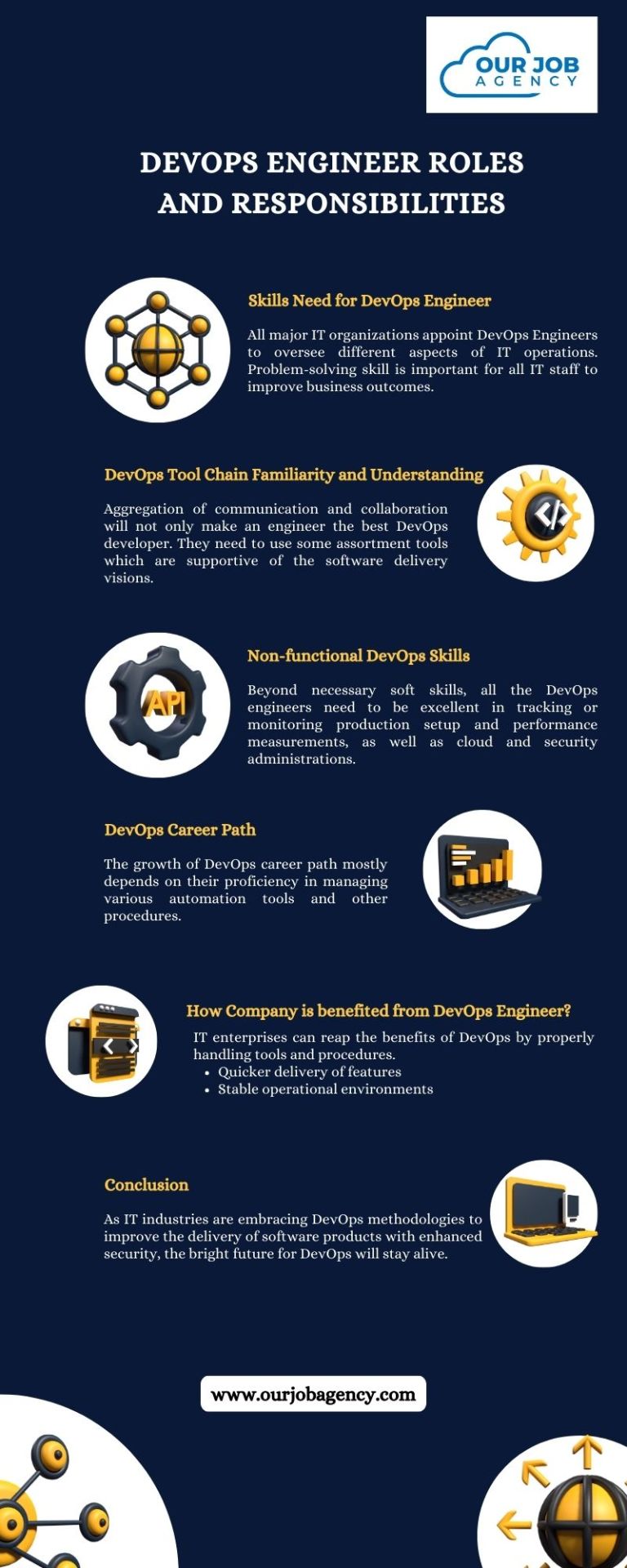
DevOps is a collaborative methodology, which connects the development and operations teams of an IT company to increase its productivity. Today, each recognized IT company creates a role of DevOps Engineer or developer to make the IT processes so cool and good.
#devops engineer roles and responsibilities#devops engineer role description#devops career path#devops engineer career path#apply devops engineer job#devops engineer job responsibility
0 notes
Text
Oh gawd, it’s all unravelling!! I’ve resorted to asking my ChatGPT for advice on how to handle this!! This is the context I put it:
work in a small startup with 7 other people
I have been brought on for a three month contract to assess the current product and make recommendations for product strategy, product roadmap, improved engineering and product processes with a view to rebuilding the platform with a new product and migrating existing vendors and borrowers across
There is one engineer and no-one else in the company has any product or technical experience
The engineer has worked on his own for 6 years on the product with no other engineering or product person
He does all coding, testing, development, devops tasks
He also helps with customer support enquires
He was not involved in the process of bringing me onboard and felt blindsided by my arrival
I have requested access to Github, and his response was:
As you can imagine access to the source code is pretty sensitive. Are you looking for something specifically? And do you plan on downloading the source code or sharing with anyone else?
He then advised they only pay for a single seat
I have spoken with the Chief Operations Officer who I report to in the contract and advised my business risk concerns around single point of failure
I have still not been granted access to Github so brought it up again today with the COO, who said he had requested 2 weeks ago
The COO then requested on Asana that the engineer add myself and himself as Github users
I received the following from the engineer:
Hey can you please send me your use cases for your access to GitHub? How exactly are you going to use your access to the source code?
My response:
Hey! My request isn’t about making changes to the codebase myself but ensuring that Steward isn’t reliant on a single person for access.
Here are the key reasons I need GitHub access:
1 Business Continuity & Risk Management – If anything happens to you (whether you’re on holiday, sick, or god forbid, get hit by a bus!!), we need someone else with access to ensure the platform remains operational. Right now, Steward has a single point of failure, which is a pretty big risk.
2 Product Oversight & Documentation – As Head of Product, I need visibility into the codebase to understand technical limitations, dependencies, and opportunities at a broad level. This DOESN'T mean I’ll be writing code, but I need to see how things are structured to better inform product decisions and prioritization.
3 Facilitating Future Hiring – If we bring in additional engineers or external contractors, we need a structured process for managing access. It shouldn't be on just one person to approve or manage this.
Super happy to discuss any concerns you have, but this is ultimately a business-level decision to ensure Steward isn’t putting itself at risk.
His response was:
1&3 Bridget has user management access for those reasons
2. no one told me you were Head of Product already, which isn’t surprising. But congrats! So will you be sharing the source code with other engineers for benchmarking?
The software engineer is an introvert and while not rude is helpful without volunteering inflation
He is also the single access for AWS, Sentry, Persona (which does our KYC checks).
I already had a conversation with him as I felt something was amiss in the first week. This was when he identified that he had been "blindsided" by my arrival, felt his code and work was being audited. I explained that it had been a really long process to get the contract (18 months), also that I have a rare mix of skills (agtech, fintech, product) that is unusually suited to Steward. I was not here to tell him what to do but to work with him, my role to setup the strategy and where we need to go with the product and why, and then work with him to come up with the best solution and he will build it. I stressed I am not an engineer and do not code.
I have raised some concerns with the COO and he seems to share some of the misgivings, I sense some personality differences, there seems like there are some undercurrents that were there before I started.
I have since messaged him with a gentler more collaborative approach:
Hey, I’ve been thinking about GitHub access and wanted to float an idea, would it make sense for us to do a working session where you just walk me through the repo first? That way, I can get a sense of the structure without us having to rush any access changes or security decisions right away. Then, we can figure out what makes sense together. What do you think?
I’m keen to understand your perspective a bit more, can we chat about it tomorrow when you're back online? Is 4pm your time still good? I know you’ve got a lot on, so happy to be flexible.
I think I’ve fucked it up, I’m paranoid the COO is going to think I’m stirring up trouble and I’m going to miss out on this job. How to be firm yet engage with someone that potentially I’ll have to work closely with(he’s a prickly, hard to engage Frenchie, who’s lived in Aus and the US for years).
5 notes
·
View notes
Text
What are the latest trends in the IT job market?

Introduction
The IT job market is changing quickly. This change is because of new technology, different employer needs, and more remote work.
For jobseekers, understanding these trends is crucial to positioning themselves as strong candidates in a highly competitive landscape.
This blog looks at the current IT job market. It offers insights into job trends and opportunities. You will also find practical strategies to improve your chances of getting your desired role.
Whether you’re in the midst of a job search or considering a career change, this guide will help you navigate the complexities of the job hunting process and secure employment in today’s market.
Section 1: Understanding the Current IT Job Market
Recent Trends in the IT Job Market
The IT sector is booming, with consistent demand for skilled professionals in various domains such as cybersecurity, cloud computing, and data science.
The COVID-19 pandemic accelerated the shift to remote work, further expanding the demand for IT roles that support this transformation.
Employers are increasingly looking for candidates with expertise in AI, machine learning, and DevOps as these technologies drive business innovation.
According to industry reports, job opportunities in IT will continue to grow, with the most substantial demand focused on software development, data analysis, and cloud architecture.
It’s essential for jobseekers to stay updated on these trends to remain competitive and tailor their skills to current market needs.
Recruitment efforts have also become more digitized, with many companies adopting virtual hiring processes and online job fairs.
This creates both challenges and opportunities for job seekers to showcase their talents and secure interviews through online platforms.
NOTE: Visit Now
Remote Work and IT
The surge in remote work opportunities has transformed the job market. Many IT companies now offer fully remote or hybrid roles, which appeal to professionals seeking greater flexibility.
While remote work has increased access to job opportunities, it has also intensified competition, as companies can now hire from a global talent pool.
Section 2: Choosing the Right Keywords for Your IT Resume
Keyword Optimization: Why It Matters
With more employers using Applicant Tracking Systems (ATS) to screen resumes, it’s essential for jobseekers to optimize their resumes with relevant keywords.
These systems scan resumes for specific words related to the job description and only advance the most relevant applications.
To increase the chances of your resume making it through the initial screening, jobseekers must identify and incorporate the right keywords into their resumes.
When searching for jobs in IT, it’s important to tailor your resume for specific job titles and responsibilities. Keywords like “software engineer,” “cloud computing,” “data security,” and “DevOps” can make a huge difference.
By strategically using keywords that reflect your skills, experience, and the job requirements, you enhance your resume’s visibility to hiring managers and recruitment software.
Step-by-Step Keyword Selection Process
Analyze Job Descriptions: Look at several job postings for roles you’re interested in and identify recurring terms.
Incorporate Specific Terms: Include technical terms related to your field (e.g., Python, Kubernetes, cloud infrastructure).
Use Action Verbs: Keywords like “developed,” “designed,” or “implemented” help demonstrate your experience in a tangible way.
Test Your Resume: Use online tools to see how well your resume aligns with specific job postings and make adjustments as necessary.
Section 3: Customizing Your Resume for Each Job Application
Why Customization is Key
One size does not fit all when it comes to resumes, especially in the IT industry. Jobseekers who customize their resumes for each job application are more likely to catch the attention of recruiters. Tailoring your resume allows you to emphasize the specific skills and experiences that align with the job description, making you a stronger candidate. Employers want to see that you’ve taken the time to understand their needs and that your expertise matches what they are looking for.
Key Areas to Customize:
Summary Section: Write a targeted summary that highlights your qualifications and goals in relation to the specific job you’re applying for.
Skills Section: Highlight the most relevant skills for the position, paying close attention to the technical requirements listed in the job posting.
Experience Section: Adjust your work experience descriptions to emphasize the accomplishments and projects that are most relevant to the job.
Education & Certifications: If certain qualifications or certifications are required, make sure they are easy to spot on your resume.
NOTE: Read More
Section 4: Reviewing and Testing Your Optimized Resume
Proofreading for Perfection
Before submitting your resume, it’s critical to review it for accuracy, clarity, and relevance. Spelling mistakes, grammatical errors, or outdated information can reflect poorly on your professionalism.
Additionally, make sure your resume is easy to read and visually organized, with clear headings and bullet points. If possible, ask a peer or mentor in the IT field to review your resume for content accuracy and feedback.
Testing Your Resume with ATS Tools
After making your resume keyword-optimized, test it using online tools that simulate ATS systems. This allows you to see how well your resume aligns with specific job descriptions and identify areas for improvement.
Many tools will give you a match score, showing you how likely your resume is to pass an ATS scan. From here, you can fine-tune your resume to increase its chances of making it to the recruiter’s desk.
Section 5: Trends Shaping the Future of IT Recruitment
Embracing Digital Recruitment
Recruiting has undergone a significant shift towards digital platforms, with job fairs, interviews, and onboarding now frequently taking place online.
This transition means that jobseekers must be comfortable navigating virtual job fairs, remote interviews, and online assessments.
As IT jobs increasingly allow remote work, companies are also using technology-driven recruitment tools like AI for screening candidates.
Jobseekers should also leverage platforms like LinkedIn to increase visibility in the recruitment space. Keeping your LinkedIn profile updated, networking with industry professionals, and engaging in online discussions can all boost your chances of being noticed by recruiters.
Furthermore, participating in virtual job fairs or IT recruitment events provides direct access to recruiters and HR professionals, enhancing your job hunt.
FAQs
1. How important are keywords in IT resumes?
Keywords are essential in IT resumes because they ensure your resume passes through Applicant Tracking Systems (ATS), which scans resumes for specific terms related to the job. Without the right keywords, your resume may not reach a human recruiter.
2. How often should I update my resume?
It’s a good idea to update your resume regularly, especially when you gain new skills or experience. Also, customize it for every job application to ensure it aligns with the job’s specific requirements.
3. What are the most in-demand IT jobs?
Some of the most in-demand IT jobs include software developers, cloud engineers, cybersecurity analysts, data scientists, and DevOps engineers.
4. How can I stand out in the current IT job market?
To stand out, jobseekers should focus on tailoring their resumes, building strong online profiles, networking, and keeping up-to-date with industry trends. Participation in online forums, attending webinars, and earning industry-relevant certifications can also enhance visibility.
Conclusion
The IT job market continues to offer exciting opportunities for jobseekers, driven by technological innovations and changing work patterns.
By staying informed about current trends, customizing your resume, using keywords effectively, and testing your optimized resume, you can improve your job search success.
Whether you are new to the IT field or an experienced professional, leveraging these strategies will help you navigate the competitive landscape and secure a job that aligns with your career goals.
NOTE: Contact Us
2 notes
·
View notes
Text
AWS DevOps Careers: Navigating the Cloud-Infused Professional Landscape
In the rapidly evolving tech terrain, the confluence of AWS and DevOps has given rise to a dynamic realm, promising an array of career prospects. This all-encompassing guide unveils the diverse roles and responsibilities within AWS DevOps, offering insights into the multifaceted career avenues that await proficient individuals.
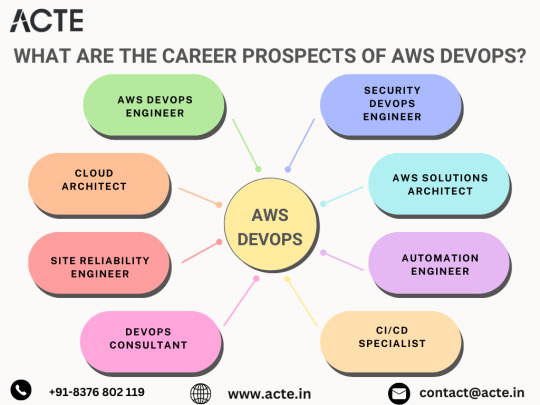
1. Crafting Cloud Solutions: The Role of an AWS DevOps Engineer
Overview: AWS DevOps Engineers serve as architects of automated software development, leveraging AWS cloud services.
Responsibilities: Dive into Infrastructure as Code (IaC), fine-tune AWS tools, and champion the principles of Continuous Integration/Continuous Deployment (CI/CD).
2. Architecting Scalable Cloud Solutions: The Realm of Cloud Architects
Overview: Cloud Architects design scalable and reliable cloud infrastructure on AWS, seamlessly aligning with DevOps principles.
Responsibilities: Collaborate to optimize AWS services, ensuring a resilient and scalable cloud environment.
3. Reliability in the Cloud: The Role of a Site Reliability Engineer (SRE)
Overview: SREs focus on ensuring system reliability, availability, and performance on AWS through vigilant monitoring and automation.
Responsibilities: Implement automation strategies, monitor AWS resources, and respond adeptly to incidents.
4. DevOps Consultancy: Guiding Organizations to DevOps Excellence
Overview: DevOps Consultants provide expertise in implementing DevOps practices, specializing in AWS services.
Responsibilities: Offer guidance on best practices, implement CI/CD pipelines, and optimize workflows using AWS tools.
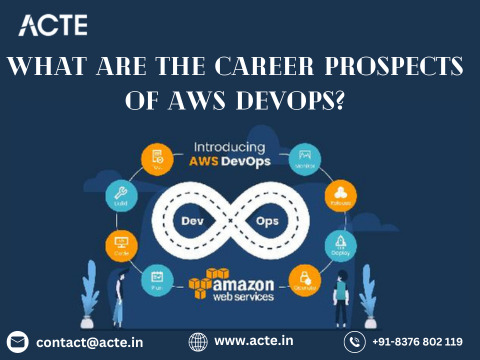
5. Embedding Security into DevOps: The Role of a Security DevOps Engineer (DevSecOps)
Overview: DevSecOps Engineers integrate security practices into the AWS DevOps pipeline.
Responsibilities: Implement robust security measures, conduct risk assessments, and ensure compliance with security policies.
6. Solutions Architecture on AWS: Crafting Business-Aligned Solutions
Overview: AWS Solutions Architects design and implement solutions aligned with business requirements, utilizing AWS services.
Responsibilities: Collaborate across teams, grasp project intricacies, and architect solutions that optimize AWS resources.
7. Scripting the Future: The Role of an Automation Engineer in AWS
Overview: Automation Engineers script and automate processes within AWS DevOps.
Responsibilities: Script infrastructure deployment, automate testing processes, and lead AWS automation initiatives.
8. Streamlining Software Delivery: The Role of a CI/CD Specialist on AWS
Overview: CI/CD Specialists optimize and streamline the software delivery pipeline within the AWS environment.
Responsibilities: Configure and manage CI/CD tools, ensuring the efficient and reliable delivery of software.
Embarking on an AWS DevOps career journey presents professionals with a landscape rich in challenges and opportunities. Each role within AWS DevOps contributes to a fulfilling and dynamic career trajectory, promising innovation and significant contributions to the ever-evolving technological realm. Best of luck as you navigate the transformative path of AWS DevOps careers!
2 notes
·
View notes
Text
Navigating the Future as Azure Certifications in 2024
In the ever-evolving landscape of cloud technology, Azure certifications continue to be instrumental in shaping the careers of IT professionals and influencing the strategies of organizations worldwide. As we step into 2024, it's essential to explore the current trends, advancements, and the transformative impact that Azure certifications are poised to have in the coming year.
The Continued Relevance of Azure Certifications
Azure certifications are not mere credentials; they are gateways to expertise and recognition in the dynamic world of cloud computing. As businesses increasingly rely on cloud solutions, the demand for skilled Azure professionals continues to grow. In 2024, Azure certifications stand as key assets, ensuring that professionals possess the knowledge and skills needed to navigate the complexities of cloud technology effectively.
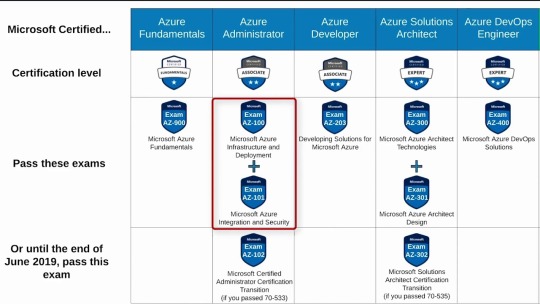
Azure Certification Paths in 2024
Azure certifications are structured into comprehensive paths, catering to individuals at various stages of their cloud journey. From foundational certifications for beginners to advanced tracks tailored for specialized roles like Azure Solutions Architect or Azure DevOps Engineer, the certification paths have evolved to align with the diverse needs of IT professionals. The year 2024 sees an increased focus on role-based certifications, allowing individuals to hone specific skills relevant to their job roles.
Key Benefits of Azure Certifications in 2024
Career Advancement:
Azure certifications are a proven catalyst for career growth. In 2024, as businesses seek skilled professionals, holding an Azure certification becomes a valuable asset for those aiming to advance their careers in cloud technology.
Industry Recognition:
Globally recognized, Azure certifications validate one's expertise in Microsoft's cloud services. Employers across industries acknowledge and value these certifications as a mark of proficiency in handling Azure-based solutions.
Continuous Learning Culture:
In 2024, Azure certifications are not just about achieving a one-time qualification; they embody a commitment to continuous learning. Microsoft regularly updates its certification paths to align with emerging technologies, encouraging professionals to stay abreast of the latest industry trends.
Increased Employability:
As the job market becomes more competitive, possessing Azure certifications enhances employability. In 2024, businesses are actively seeking candidates with practical Azure skills, making certification holders highly sought after.
Emerging Trends in Azure Certifications for 2024
Micro-Certifications:
2024 witnesses a rise in micro-certifications, focusing on specific, targeted skills. These bite-sized certifications allow professionals to demonstrate expertise in niche areas, providing a more granular approach to skill validation.
Scenario-Based Assessments:
Azure certification exams in 2024 are increasingly incorporating scenario-based questions. This shift aims to evaluate not just theoretical knowledge but the ability to apply that knowledge in practical, real-world situations.
Integration of AI and ML:
With the growing importance of artificial intelligence (AI) and machine learning (ML), Azure certifications in 2024 are placing a greater emphasis on these technologies. Certification tracks dedicated to AI and ML applications within Azure are gaining prominence.
Focus on Security:
In response to the heightened concern for cybersecurity, Azure certifications in 2024 place a significant focus on security-related tracks. Azure Security Engineer certifications are expected to be in high demand as organizations prioritize securing their cloud environments.
Tips for Success in Azure Certifications 2024
Stay Updated: Given the evolving nature of technology, staying updated with the latest Azure services and features is crucial. Regularly check Microsoft's official documentation and announcements for any updates.
Hands-On Experience: Practical experience is invaluable. Utilize Azure's sandbox environments, participate in real-world projects, and engage with the Azure portal to reinforce your theoretical knowledge.
Leverage Learning Resources: Microsoft provides a wealth of learning resources, including online courses, documentation, and practice exams. Take advantage of these resources to supplement your preparation.
Join the Azure Community: Engage with the Azure community through forums, webinars, and social media. Networking with professionals in the field can provide insights, tips, and support during your certification journey.
Conclusion
As we venture into 2024, Azure certifications stand as pivotal tools for IT professionals aiming to thrive in the dynamic world of cloud technology. Whether you are starting your journey with foundational certifications or advancing your skills with specialized tracks, Azure certifications in 2024 represent more than just qualifications – they symbolize a commitment to excellence, continuous learning, and a future shaped by innovation in the cloud. Embrace the opportunities, stay ahead of the curve, and let Azure certifications be your guide to success in the ever-evolving realm of cloud proficiency.

Frequently Asked Questions (FAQs)
What are the new Azure certifications introduced in 2024?
As of 2024, Microsoft has introduced several new certifications to align with emerging technologies. Notable additions include specialized tracks focusing on AI, ML, and advanced security.
How has the exam format changed for 2024?
The exam format in 2024 has evolved to include more scenario-based questions. This change is aimed at assessing practical application skills in addition to theoretical knowledge.
Are there any prerequisites for Azure certifications in 2024?
Prerequisites vary based on the specific certification. While some foundational certifications may have no prerequisites, advanced certifications often require prior experience or the completion of specific lower-level certifications.
Can I still take exams for older Azure certifications in 2024?
Microsoft often provides a transition period for older certifications, allowing candidates to complete them even as new certifications are introduced. However, it's advisable to check Microsoft's official documentation for specific details.
How frequently are Azure certifications updated?
Azure certifications are regularly updated to stay aligned with the latest technologies and industry trends. Microsoft recommends that candidates stay informed about updates through official communication channels.
4 notes
·
View notes
Text
Python FullStack Developer Jobs

Introduction :
A Python full-stack developer is a professional who has expertise in both front-end and back-end development using Python as their primary programming language. This means they are skilled in building web applications from the user interface to the server-side logic and the database. Here’s some information about Python full-stack developer jobs.
Job Responsibilities:
Front-End Development: Python full-stack developers are responsible for creating and maintaining the user interface of a web application. This involves using front-end technologies like HTML, CSS, JavaScript, and various frameworks like React, Angular, or Vue.js.
Back-End Development: They also work on the server-side of the application, managing databases, handling HTTP requests, and building the application’s logic. Python, along with frameworks like Django, Flask, or Fast API, is commonly used for back-end development.
Database Management: Full-stack developers often work with databases like PostgreSQL, MySQL, or NoSQL databases like MongoDB to store and retrieve data.
API Development: Creating and maintaining APIs for communication between the front-end and back-end systems is a crucial part of the job. RESTful and Graph QL APIs are commonly used.
Testing and Debugging: Full-stack developers are responsible for testing and debugging their code to ensure the application’s functionality and security.
Version Control: Using version control systems like Git to track changes and collaborate with other developers.
Deployment and DevOps: Deploying web applications on servers, configuring server environments, and implementing continuous integration/continuous deployment (CI/CD) pipelines.
Security: Ensuring the application is secure by implementing best practices and security measures to protect against common vulnerabilities.
Skills and Qualifications:
To excel in a Python full-stack developer role, you should have the following skills and qualifications:
Proficiency in Python programming.
Strong knowledge of front-end technologies (HTML, CSS, JavaScript) and frameworks.
Expertise in back-end development using Python and relevant web frameworks.
Experience with databases and data modeling.
Knowledge of version control systems (e.g., Git).
Familiarity with web servers and deployment.
Understanding of web security and best practices.
Problem-solving and debugging skills.
Collaboration and teamwork.
Continuous learning and staying up to date with the latest technologies and trends.
Job Opportunities:
Python full-stack developers are in demand in various industries, including web development agencies, e-commerce companies, startups, and large enterprises. Job titles you might come across include Full-Stack Developer, Python Developer, Web Developer, or Software Engineer.
The job market for Python full-stack developers is generally favorable, and these professionals can expect competitive salaries, particularly with experience and a strong skill set. Many companies appreciate the versatility of full-stack developers who can work on both the front-end and back-end aspects of their web applications.
To find Python full-stack developer job opportunities, you can check job boards, company career pages, and professional networking sites like LinkedIn. Additionally, you can work with recruitment agencies specializing in tech roles or attend tech job fairs and conferences to network with potential employers.
Python full stack developer jobs offer a range of advantages to those who pursue them. Here are some of the key advantages of working as a Python full stack developer:
Versatility: Python is a versatile programming language, and as a full stack developer, you can work on both front-end and back-end development, as well as other aspects of web development. This versatility allows you to work on a wide range of projects and tasks.
High demand: Python is one of the most popular programming languages, and there is a strong demand for Python full stack developers. This high demand leads to ample job opportunities and competitive salaries.
Job security: With the increasing reliance on web and mobile applications, the demand for full stack developers is expected to remain high. This job security provides a sense of stability and long-term career prospects.
Wide skill set: As a full stack developer, you gain expertise in various technologies and frameworks for both front-end and back-end development, including Django, Flask, JavaScript, HTML, CSS, and more. This wide skill set makes you a valuable asset to any development team.
Collaboration: Full stack developers often work closely with both front-end and back-end teams, fostering collaboration and communication within the development process. This can lead to a more holistic understanding of projects and better teamwork.
Problem-solving: Full stack developers often encounter challenges that require them to think critically and solve complex problems. This aspect of the job can be intellectually stimulating and rewarding.
Learning opportunities: The tech industry is constantly evolving, and full stack developers have the opportunity to continually learn and adapt to new technologies and tools. This can be personally fulfilling for those who enjoy ongoing learning.
Competitive salaries: Python full stack developers are typically well-compensated due to their valuable skills and the high demand for their expertise. Salaries can vary based on experience, location, and the specific organization.
Entrepreneurial opportunities: With the knowledge and skills gained as a full stack developer, you can also consider creating your own web-based projects or startup ventures. Python’s ease of use and strong community support can be particularly beneficial in entrepreneurial endeavors.
Remote work options: Many organizations offer remote work opportunities for full stack developers, allowing for greater flexibility in terms of where you work. This can be especially appealing to those who prefer a remote or freelance lifestyle.
Open-source community: Python has a vibrant and active open-source community, which means you can easily access a wealth of libraries, frameworks, and resources to enhance your development projects.
Career growth: As you gain experience and expertise, you can advance in your career and explore specialized roles or leadership positions within development teams or organizations.
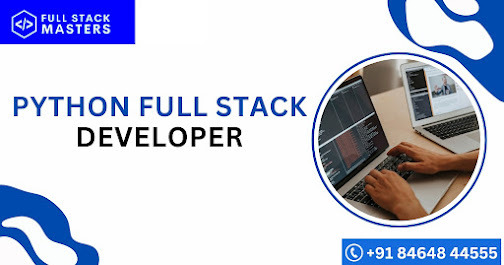
Conclusion:
Python full stack developer jobs offer a combination of technical skills, career stability, and a range of opportunities in the tech industry. If you enjoy working on both front-end and back-end aspects of web development and solving complex problems, this career path can be a rewarding choice.
Thanks for reading, hopefully you like the article if you want to take Full stack master's course from our Institute, please attend our live demo sessions or contact us: +918464844555 providing you with the best Online Full Stack Developer Course in Hyderabad with an affordable course fee structure.
2 notes
·
View notes
Text
Java Full Stack Training Institute in Saravanampatti – Qtree Technologies
Are you looking to build a rewarding career in software development? Want to master both front-end and back-end technologies using Java? Look no further! Qtree Technologies, the leading Java Full Stack Training Institute in Saravanampatti, Coimbatore, is your one-stop destination for industry-relevant training, hands-on coding, and job-ready skills.
Why Java Full Stack Development?
Java Full Stack Development is one of the most in-demand skills in the IT industry. A Full Stack Java Developer is equipped to handle both the front-end (user interface) and back-end (server/database) parts of a web application, making them highly valuable to companies of all sizes.
What You Learn in Java Full Stack:
Front-End Technologies: HTML, CSS, JavaScript, Bootstrap, React or Angular
Back-End Programming: Core Java, Advanced Java, Spring Boot
Database Management: MySQL, MongoDB
Version Control & Deployment: Git, GitHub, Jenkins, Docker
Becoming a full stack developer not only makes you versatile but also opens doors to top job roles like Software Engineer, Java Developer, Web Developer, and more.
Why Choose Qtree Technologies?
As a reputed Java Full Stack Training Institute in Coimbatore, Qtree Technologies has trained and placed thousands of students in top MNCs. With a focus on practical, job-oriented learning, we are committed to making you a skilled full stack developer from scratch.
Key Highlights of Our Java Full Stack Course:
✅ Industry-Experienced Trainers Our faculty comprises certified professionals and real-time developers who bring real-world coding experience into the classroom.
✅ Hands-on Live Projects We ensure that you learn by doing. Our course includes multiple mini-projects and a final capstone project to build your portfolio.
✅ Updated Curriculum Our course syllabus is regularly updated to align with industry trends and includes the latest frameworks like Spring Boot and React JS.
✅ Job-Oriented Training From writing clean code to cracking technical interviews, we prepare you for the complete job cycle.
✅ Flexible Timings & Online Batches We offer weekday, weekend, and fast-track options along with online training for your convenience.
✅ 100% Placement Support Our dedicated placement cell provides resume building, mock interviews, and connects you with top hiring companies.
✅ Affordable Fee Structure Learn Java Full Stack Development at an affordable price without compromising quality.
Who Can Join?
Our Java Full Stack Developer course is suitable for:
Fresh Graduates (B.E., B.Tech, B.Sc., BCA, MCA, etc.)
Working Professionals wanting to upskill
Freelancers & Entrepreneurs developing web apps
Anyone passionate about building full-fledged web applications
Course Modules Overview
Here’s a snapshot of what you’ll learn at Qtree Technologies:
1. HTML5, CSS3, and Bootstrap
Responsive web design
Creating attractive UI layouts
2. JavaScript & DOM Manipulation
Event handling
API interaction
3. React JS or Angular (Student Choice)
Component-based architecture
Routing and state management
4. Core Java
OOPs Concepts
Collections, Multithreading, Exception Handling
5. Advanced Java (JDBC, Servlets, JSP)
Connecting to databases
Server-side scripting
6. Spring Framework & Spring Boot
Dependency Injection
REST API development
Security and Microservices basics
7. Database
MySQL queries, joins, normalization
MongoDB (for NoSQL basics)
8. DevOps Tools
Git, GitHub, Maven
Basic CI/CD setup
9. Final Project
End-to-end application development
Hosting on cloud or GitHub
Career Opportunities After Course Completion
With Java Full Stack skills, you can pursue roles like:
Java Full Stack Developer
Front-End Developer
Back-End Developer (Java)
Web Application Developer
Software Engineer
Companies like Infosys, TCS, Wipro, Cognizant, Accenture, and startups are actively hiring full stack developers.
Salary Range: ₹4 LPA to ₹12+ LPA based on your skills and experience.
What Our Students Say
“Qtree Technologies provided me with the best Java Full Stack training. The trainers are excellent, and I got placed immediately after the course.” — Vikram Raj, Full Stack Developer at Cognizant
“Their practical sessions and project-based learning gave me real confidence to face interviews and get into the IT industry.” — Nisha M, Software Engineer at Capgemini
Visit Us Today!
If you're looking to join the best Java Full Stack Training Institute in Saravanampatti, your journey starts at Qtree Technologies.
📍 Address:
Qtree Technologies No 126/3, 2nd Floor, Upstairs of Ramani Mahindra SUV Showroom, Mahaveer Towers, Poonthottam Nagar, Ramanandha Nagar, Saravanampatti, Coimbatore, Tamil Nadu – 641035
📞 Contact: 84899 54222
🌐 Website: www.qtreetechnologies.in
0 notes
Text
Ensuring Security & Compliance in AI-Driven Software Development

The Evolving Threat Landscapes for AI-Driven Software
As AI systems become more complex, they also become more vulnerable. The blog outlines emerging risks like data poisoning, model inversion, and adversarial attacks, which can compromise both integrity and privacy.
Key Security Considerations
To protect AI systems, developers must:
Secure training data and prevent manipulation
Shield models from reverse engineering
Safeguard APIs and endpoints against malicious access
Security must be built into AI — not added as an afterthought.
Ensuring Secure AI Product Development
I) Technical Safeguards Include:
Encryption and secure model deployment
Access controls and audit trails
Monitoring for anomalies in model behavior
II) Organizational Practices Should Cover:
Risk assessments at every phase
Secure DevOps (DevSecOps) integration
Clear roles and responsibilities for compliance
Future-Proofing AI Security and Compliance
The blog also explores:
Innovative technologies like federated learning and differential privacy
Adaptive compliance models that evolve with regulations like GDPR and HIPAA
Security and compliance are no longer optional — they’re foundational. This blog provides a practical, forward-thinking roadmap to help leaders build trustworthy AI solutions in a rapidly changing digital world.
Read More: https://www.damcogroup.com/blogs/security-compliance-in-ai-driven-software-development
#ai software development#ai software solutions#ai software development services#ai software development company
0 notes
Text
DevSecOps Certification: Everything You Need to Know
Introduction: Why DevSecOps Matters More Than Ever
In today’s world of frequent cyberattacks and rapidly evolving software deployment cycles, integrating security into every stage of the software development process is no longer optiona it's essential. That’s where DevSecOps comes in. Short for Development, Security, and Operations, DevSecOps is a modern approach that ensures security is baked into DevOps workflows right from the beginning.
Whether you’re a developer, operations engineer, or cybersecurity enthusiast, earning a DevSecOps Certification can significantly boost your career prospects. But with so many courses, pathways, and free training options available, how do you navigate your way through them?
In this blog, we’ll walk you through everything you need to know about DevSecOps certifications including the DevSecOps certification path, popular credentials, DevSecOps training free options, and how to get started with a DevSecOps course online.
What Is DevSecOps?
DevSecOps is the practice of integrating security into every phase of the software development lifecycle from initial design through integration, testing, deployment, and software delivery. The core idea is simple: build security into the product, not just add it on at the end.
Traditionally, security was handled after the development phase, but this created bottlenecks and vulnerabilities. DevSecOps solves this by automating security checks and fostering a culture of shared responsibility among developers, operations teams, and security professionals.
Why Get a DevSecOps Certification?
1. Career Growth and Demand
As cyber threats rise and organizations prioritize secure deployments, professionals with DevSecOps expertise are in high demand. Certified professionals are often considered for higher-paying roles, including:
DevSecOps Engineers
Application Security Engineers
Cloud Security Architects
Secure DevOps Consultants
According to industry studies, DevSecOps roles have seen a salary increase of 12–15% over the last three years.
2. Stand Out in the Job Market
With a DevSecOps certification, you demonstrate validated expertise. Whether you're applying for a new job or seeking promotion, a recognized credential makes your resume stand out.
3. Structured Learning Path
DevSecOps certifications follow a logical progression. You learn the principles of secure development, gain practical experience with tools, and build confidence through real-world use cases.
The DevSecOps Certification Path: Beginner to Advanced
To help you plan your journey, here’s a simplified DevSecOps certification path you can follow based on your experience level:
Step 1: DevSecOps Tutorial for Beginners
This is where you start if you’re new. A DevSecOps tutorial for beginners introduces:
Basic DevOps principles
Introduction to security automation
Security tools like SAST, DAST, and dependency scanning
Overview of CI/CD pipeline security
Free tutorials and videos are widely available and a great place to build your foundation.
Step 2: Enroll in a DevSecOps Course Online
After learning the basics, formalize your knowledge with a DevSecOps course online. This will help you:
Learn hands-on security practices
Master tools like Jenkins, GitLab, SonarQube, Aqua, and more
Secure container deployments using Kubernetes and Docker
Build secure CI/CD pipelines
Courses often include interactive labs, projects, and exams to test your understanding.
Step 3: Earn a Recognized DevSecOps Certification
Once you’re confident, pursue a certification that validates your skills. Some leading DevSecOps certifications include:
Certified DevSecOps Professional (CDP)
DevSecOps Foundation Certification
AWS DevSecOps Certification
Azure DevSecOps Certification
These certifications test your ability to integrate security in cloud-native environments and automate compliance processes.
Top DevSecOps Certifications You Should Know
Let’s break down some of the most recognized DevSecOps certifications in the industry today:
1. Certified DevSecOps Professional (CDP)
Focus: Tooling, automation, cloud security
Skills: CI/CD hardening, IaC security, secrets management
Format: Online exam with hands-on tasks
2. DevSecOps Foundation Certification
Focus: Culture and principles
Ideal for: Managers, project leads, new practitioners
Format: Theory-based exam
3. AWS DevSecOps Certification
Focus: Securing AWS pipelines and cloud deployments
Ideal for: Cloud engineers and architects
Tools: AWS CodePipeline, AWS Inspector, GuardDuty
4. Azure DevSecOps Certification
Focus: Microsoft cloud environments
Tools: Azure DevOps, Defender for Cloud, Policy-as-Code
These certifications align with the DevSecOps certification path and offer specializations based on your platform or role.
DevSecOps Training Free Resources: Learn Without Paying a Dime
If you're not ready to invest financially, several DevSecOps training free options can help you start learning:
Open-source labs and GitHub projects: Many DevSecOps projects are freely available for experimentation.
Free online courses: Some platforms offer introductory DevSecOps course online modules at no cost.
YouTube tutorials: Channels provide real-world walkthroughs, especially for beginners.
H2K Infosys offers structured training with periodic free workshops and career guidance.
Use these resources to gain confidence before enrolling in paid certification courses.
What You’ll Learn in a DevSecOps Course Online
A well-structured DevSecOps course online will walk you through both theory and practical skills. Here's what a typical course covers:
Security Principles in DevOps
Shift-left security
Zero trust and secure defaults
Threat modeling and risk assessment
Toolchain Integration
Jenkins, GitHub Actions, GitLab CI
Static and dynamic analysis tools
Software Composition Analysis (SCA)
Cloud & Container Security
Docker image scanning
Kubernetes policy enforcement
Infrastructure as Code (IaC) security (e.g., Terraform, Ansible)
Secure CI/CD Pipelines
Secrets management (Vault, AWS Secrets Manager)
Security gates in CI/CD flows
Runtime monitoring and alerting
Real-World Use Cases of DevSecOps
Here are a few ways companies use DevSecOps in practice:
Case Study 1: Healthcare App Development
A health tech company integrated automated compliance checks to meet HIPAA requirements. This reduced manual testing efforts by 40% and improved deployment security.
Case Study 2: E-commerce Platform
A leading e-commerce provider used DevSecOps pipelines to block vulnerable packages before they reached production, preventing multiple high-severity CVEs.
These examples highlight how real-world DevSecOps application improves both speed and safety.
Tools Commonly Used in DevSecOps
Here are some tools you’ll likely use on your DevSecOps journey: FunctionToolsCI/CDJenkins, GitLab CI, GitHub ActionsStatic Analysis (SAST)SonarQube, CodeQL, FortifyDynamic Analysis (DAST)OWASP ZAP, Burp SuiteSCAWhiteSource, Snyk, OWASP Dependency-CheckContainer SecurityAqua Security, Twistlock, TrivySecrets ManagementHashiCorp Vault, AWS Secrets Manager
Hands-on knowledge of these tools is essential for most DevSecOps certifications.
Beginner Tips: How to Start with DevSecOps
If you're just starting out, here’s a simple roadmap to follow:
Watch a DevSecOps tutorial for beginners (understand basic concepts).
Explore DevSecOps training free materials (learn fundamentals without commitment).
Choose a beginner-friendly DevSecOps course online (gain hands-on experience).
Practice with real projects (create your own CI/CD pipeline and add security tools).
Attempt certification exams to showcase your skills to employers.
DevSecOps vs Traditional Security: Key Differences
AspectTraditional SecurityDevSecOpsTiming of SecurityPost-developmentEarly and continuousResponsibilitySecurity team onlyShared by dev, ops, and securitySpeedSlower release cyclesAccelerated with built-in checksToolingManual and reactiveAutomated and proactive
DevSecOps doesn't just improve security it enables faster delivery, greater agility, and reduced costs over time.
Who Should Pursue a DevSecOps Certification?
You don’t need to be a cybersecurity expert to begin. Ideal candidates include:
DevOps Engineers looking to add security skills
Developers wanting to write secure code
Security Analysts aiming to shift left
System Admins managing CI/CD pipelines
IT professionals seeking cloud security roles
Whether you're an entry-level professional or a senior engineer, there's a DevSecOps course online or certification tailored to your needs.
Why Choose H2K Infosys for DevSecOps Training?
H2K Infosys offers industry-aligned training programs tailored to both beginners and professionals. Their DevSecOps course online includes:
Real-time project implementation
Lab exercises with major DevSecOps tools
Career support and mock interviews
While many platforms offer tutorials, H2K Infosys emphasizes mentorship, hands-on learning, and job placement support making it a smart choice for career advancement.
Final Thoughts: Certification Is Just the Beginning
Getting certified in DevSecOps is not just about passing an exam it's about adopting a mindset that values speed, security, and collaboration. With the right training, tools, and resources, you can become an integral part of the software security movement.
Key Takeaways
DevSecOps certification validates your skills in secure development and CI/CD practices.
Start with a DevSecOps tutorial for beginners, then move to a structured DevSecOps course online.
Explore DevSecOps training free resources before committing to paid programs.
Choose certifications aligned with your career goals and technical background.
Hands-on learning with real tools is essential for success.
Platforms like H2K Infosys provide structured guidance and job-focused training.
Ready to level up your security skills? Start your DevSecOps journey today and future-proof your career. Explore certification paths, gain hands-on experience, and make your mark in secure DevOps.
0 notes
Text
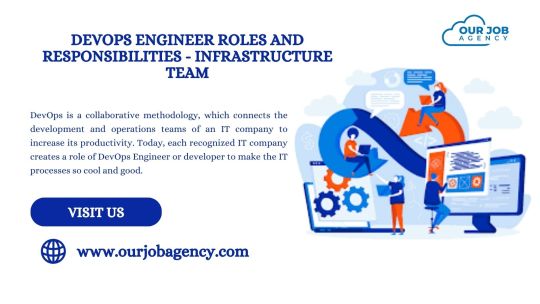
DevOps is a collaborative methodology, which connects the development and operations teams of an IT company to increase its productivity. Today, each recognized IT company creates a role of DevOps Engineer or developer to make the IT processes so cool and good.
#devops engineer roles and responsibilities#devops engineer role description#devops career path#devops engineer career path#apply devops engineer job#devops engineer job responsibility
0 notes
Text
What Do DevOps Actually Do in Your Company?
The term "DevOps" is frequently mentioned in IT conversations, job postings, and digital transformation strategies—but what do DevOps professionals actually do in a company? Contrary to the myth that DevOps is just about automation tools or deployment scripts, DevOps engineers play a multifaceted role. They bridge development and operations, streamline workflows, reduce downtime, and ensure that software delivery is fast, efficient, and reliable.
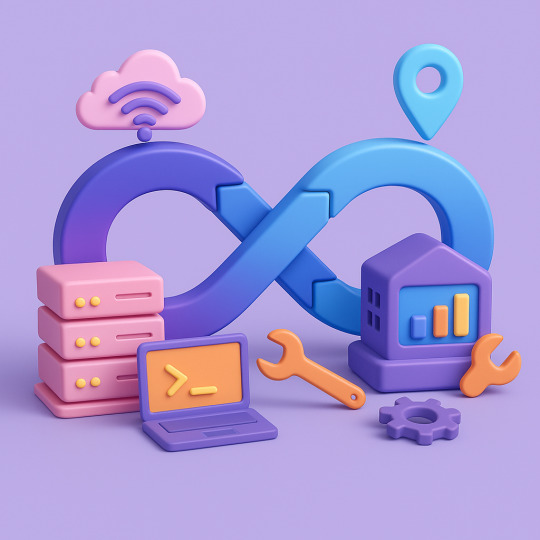
At its core, DevOps is a combination of cultural philosophies, practices, and tools that increase an organization’s ability to deliver applications and services at high velocity. DevOps teams collaborate across departments, focusing on continuous integration (CI), continuous delivery (CD), infrastructure as code (IaC), monitoring, and incident response.
Companies that adopt managed DevOps services often see a radical shift in productivity, system reliability, and deployment speed. This model enables in-house teams to focus on product innovation, while external DevOps experts manage the backbone of infrastructure and process automation.
Key Responsibilities of DevOps in a Company
1. Automating Workflows: One of the most visible contributions of a DevOps engineer is automation. DevOps professionals build pipelines that automatically test, integrate, and deploy code, ensuring that developers can ship features quickly and reliably. This eliminates manual bottlenecks and reduces the chances of human error.
2. Managing Infrastructure: DevOps teams use tools like Terraform, Ansible, and Kubernetes to manage cloud infrastructure. They ensure systems are scalable, secure, and resilient. As part of DevOps as a service companies, experts help build infrastructure that’s elastic and can adapt to business needs in real time.
3. Monitoring & Incident Response: Once software is live, DevOps teams monitor performance, availability, and security. Using tools like Prometheus, Grafana, and ELK Stack, they catch bugs early, ensure minimal downtime, and help teams respond to incidents faster. This keeps the customer experience smooth and uninterrupted.
4. Collaboration & Culture Building: DevOps is as much about people as it is about tools. Engineers act as the glue between development, QA, and operations, fostering a culture of shared responsibility. They promote transparency, frequent communication, and collective ownership of outcomes.
Example: How DevOps Streamlined Product Delivery
Take the example of a SaaS-based healthtech company that needed to scale during a product launch. Before DevOps, deployment cycles took weeks, and outages were frequent. By integrating a CI/CD pipeline, containerizing their services, and implementing real-time monitoring, their release cycle shrunk to just a few hours.
More importantly, the DevOps team collaborated with developers to optimize code performance and with operations to automate rollback strategies in case of failures. The result? Faster releases, reduced downtime, and a better user experience.
For DevOps startups, this kind of agility is not optional—it’s a necessity. DevOps allows these lean teams to innovate faster while maintaining robust system performance.
Why DevOps Roles Are Strategic
DevOps engineers don’t just solve technical problems—they solve business problems. From reducing time-to-market and enabling faster innovation to minimizing service disruptions, their impact goes far beyond code. This is why many organizations turn to professional DevOps consulting services. These services bring in expertise, best practices, and a scalable framework tailored to the organization’s needs.
A famous quote from Jez Humble, co-author of The DevOps Handbook, sums it up perfectly: “DevOps is not a goal, but a never-ending process of continual improvement.” In this spirit, DevOps engineers are the catalysts for evolution in modern IT organizations.
Final Thoughts
To truly understand what DevOps professionals do in a company is to recognize their value in building, scaling, and maintaining the systems that drive business outcomes. Whether they’re automating pipelines, managing cloud environments, or fostering team collaboration, their work ensures that software delivery is fast, stable, and customer-centric.
If your business is looking to unlock the full potential of DevOps, visit Cloudastra Technology: Cloudastra DevOps as a Services. Whether you're scaling a startup or modernizing enterprise infrastructure, our DevOps experts are here to guide you every step of the way.
0 notes
Text
Mastering DevOps: A Path to Tech Leadership and Innovation
In the ever-evolving landscape of technology, DevOps stands out as an indicator of innovation and efficiency. As we navigate the digital age, the role of DevOps, which seamlessly blends development and operations practices, has become increasingly important. It not only accelerates software delivery but also promotes collaboration, enhances automation, and ensures the delivery of high-quality applications. If you're considering a career in tech, DevOps is an enticing and promising option. In this comprehensive exploration, we'll dive deep into the world of DevOps careers, unveiling the manifold opportunities, challenges, and avenues for growth that it offers.
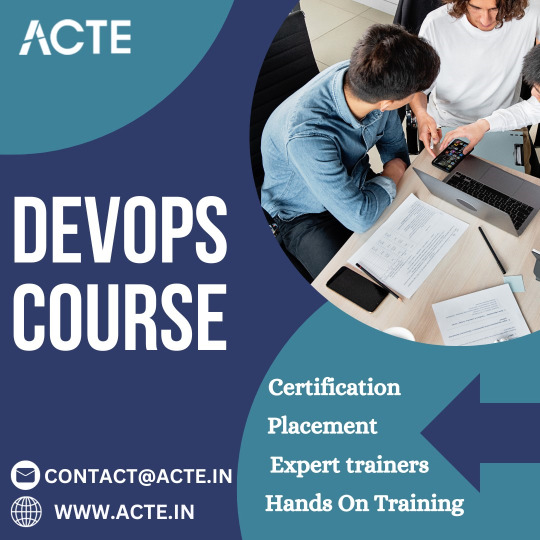
Why DevOps? The Irresistible Appeal
1. High Demand for DevOps Professionals
In a world where businesses are constantly striving for efficiency and agility, DevOps professionals are in high demand. Organizations of all sizes, from startups to Fortune 500 giants, recognize the value of DevOps in streamlining development processes, enhancing automation, and improving collaboration among cross-functional teams. This demand translates into a plethora of job opportunities for DevOps experts.
2. Competitive Salaries
In the realm of tech careers, compensation is often a significant factor. DevOps practitioners frequently enjoy competitive salaries, and experienced DevOps engineers, in particular, are handsomely rewarded. This makes DevOps not only a fulfilling career but also a financially rewarding one.
3. Versatility Across Industries
One of the striking features of a DevOps career is its versatility. DevOps skills are transferable across various industries, including finance, healthcare, e-commerce, and more. The fundamental principles and tools of DevOps are universally applicable, allowing you to explore different sectors while leveraging your expertise.
4. Continuous Learning and Adaptation
The tech world thrives on change, and DevOps is no exception. This dynamic field continuously evolves with the emergence of new tools and practices. Staying updated with the latest trends and technologies is not just a requirement but a thrilling aspect of a DevOps career. The pursuit of knowledge and adaptation are ingrained in the DevOps culture.
5. Enhanced Efficiency Through Automation
At the core of DevOps lies the principle of automation. DevOps practices emphasize automating manual processes, reducing errors, and accelerating deployment cycles. The result is enhanced efficiency in development pipelines, enabling teams to deliver software faster and with higher quality.
6. Collaboration as a Core Value
DevOps promotes collaboration and communication between traditionally siloed teams, such as development and operations. This cultural shift towards teamwork and shared responsibilities fosters a more inclusive and productive workplace environment.
7. A Path to Leadership
A DevOps career is not just about technical skills; it's also a pathway to leadership positions. As you gain experience and expertise, you'll find yourself well-equipped to step into roles like DevOps manager, architect, or consultant, where you can influence and shape the DevOps practices of your organization.
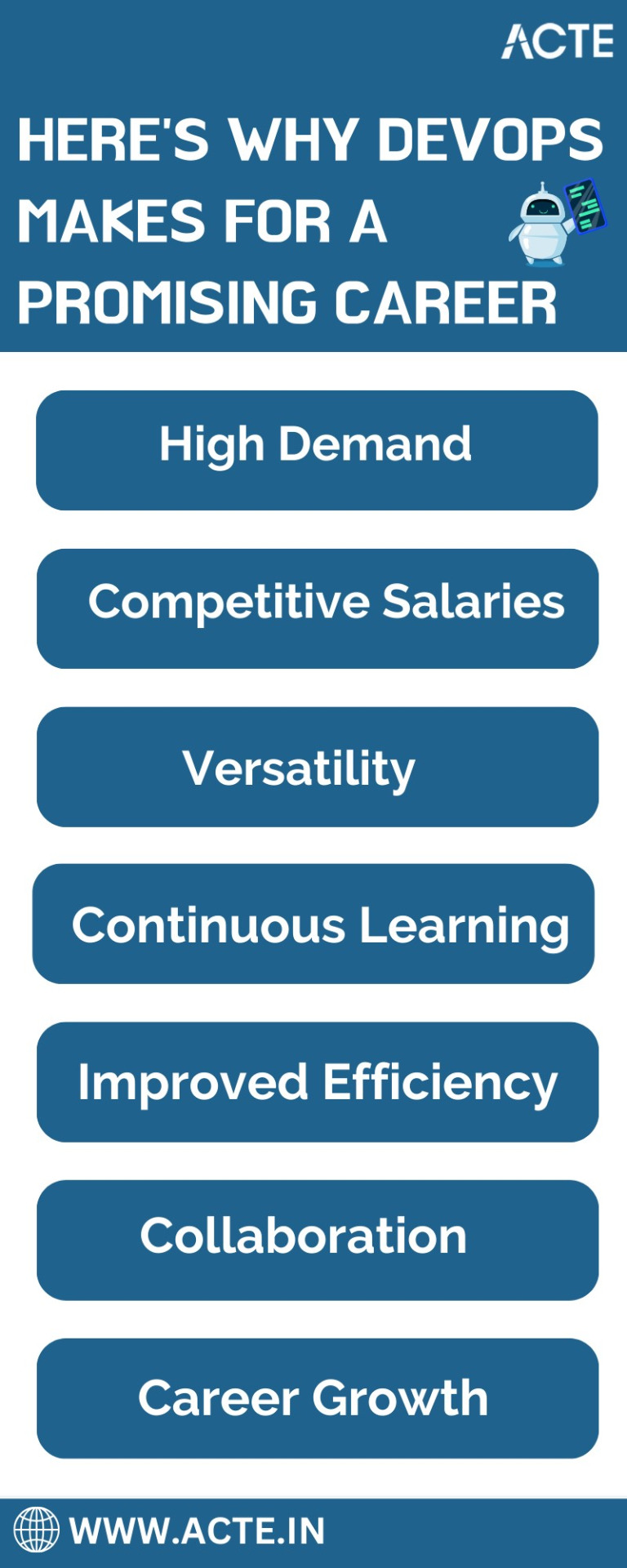
The Future of DevOps: A World of Innovation
As we peer into the future, the DevOps landscape promises even more exciting developments:
1. Advanced Automation and AI
Automation will continue to be a driving force in DevOps, with artificial intelligence (AI) playing a more significant role. AI-powered tools will enhance predictive analytics, optimize resource allocation, and further reduce manual intervention in the software development lifecycle.
2. DevOps in Edge Computing
The rise of edge computing, driven by the Internet of Things (IoT), presents new challenges and opportunities for DevOps. DevOps practices will expand to accommodate the unique demands of edge environments, enabling real-time data processing and analysis at the edge of the network.
3. Security-First DevOps
With cybersecurity concerns on the rise, DevOps will place an even greater emphasis on security practices. DevSecOps, the integration of security into the DevOps pipeline, will become standard practice, ensuring that security is not an afterthought but an integral part of the development process.
4. Hybrid and Multi-Cloud DevOps
Hybrid and multi-cloud environments are becoming increasingly prevalent. DevOps will continue to evolve to seamlessly integrate on-premises and cloud resources, providing organizations with the flexibility to choose the best infrastructure for their needs.
5. DevOps as a Service
DevOps as a Service (DaaS) is gaining traction. Organizations will increasingly turn to third-party providers for DevOps solutions, allowing them to focus on their core competencies while leveraging the expertise of specialized DevOps teams.
In a world driven by technology, a career in DevOps offers an exciting journey filled with opportunities for growth and innovation. Whether you're just starting your career or looking to make a transition, DevOps holds the promise of a rewarding path.
To embark on this journey, it's essential to equip yourself with the right skills and knowledge. ACTE Technologies, a renowned provider of DevOps training and certification programs, stands ready to be your guiding light. Their expert-led courses can help you build a complex foundation in DevOps principles, master the relevant tools, and stay ahead in this ever-evolving field.
So, embrace the future of technology with a career in DevOps, and let ACTE Technologies be your trusted companion on the road to excellence. As you explore the endless possibilities of DevOps careers, may your passion for innovation and your commitment to continuous learning lead you to success and fulfillment.
11 notes
·
View notes
Text
Demystifying DevOps: Harmonizing Development and Operations
DevOps Essentials: DevOps serves as a conduit for collaboration and heightened productivity between software development and IT operations teams. At its core, DevOps aims to streamline the software development lifecycle, ensuring the continuous delivery of top-tier software. Key tenets include automation, collaboration, and the implementation of continuous integration/continuous deployment (CI/CD) processes.
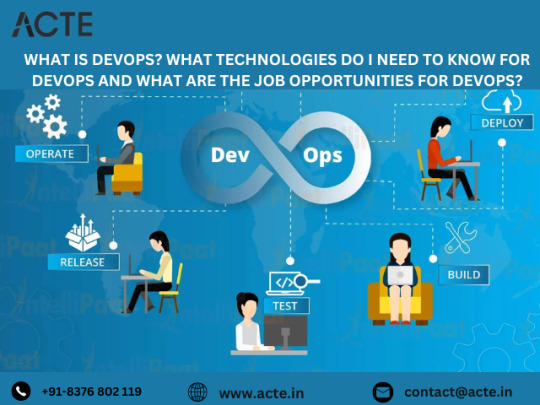
Unveiling the Core Tenets:
Collaboration: Breaking down silos to create a shared culture and responsibilities between development and operations teams.
Automation: Leveraging automated processes to eliminate manual tasks, reduce errors, and enhance efficiency.
CI/CD: Emphasizing continuous integration and deployment for swift and reliable software releases.
Diverse Career Paths in the DevOps Realm
1. DevOps Engineer: Role: Implementation and management of tools and processes for streamlined software development, testing, and deployment. Responsibilities: Collaborate across teams, optimize CI/CD pipelines, and ensure the efficiency of software delivery.
2. Site Reliability Engineer (SRE): Role: Concentration on ensuring the reliability, availability, and performance of systems through automation, monitoring, and incident response. Responsibilities: Implementation of robust monitoring solutions, automation of recovery processes, and improvement of system reliability.
3. Cloud Engineer: Role: Specialization in designing, implementing, and maintaining cloud infrastructure, often involving Infrastructure as Code (IaC) tools and cloud provider services. Responsibilities: Optimization of cloud environments, ensuring scalability, and managing infrastructure through code.
4. Automation Engineer: Role: Development of scripts and tools to automate manual processes, enhancing efficiency and minimizing human errors. Responsibilities: Identification of areas for automation, script creation, and monitoring of automated processes.
5. Release Manager: Role: Coordination of the release process, ensuring efficient and reliable software delivery with minimal disruptions. Responsibilities: Collaboration with development and operations teams, planning of release schedules, and overseeing deployment processes.
6. Security DevOps Engineer (DevSecOps): Role: Integration of security practices into the DevOps pipeline, ensuring security considerations at every stage of development and deployment. Responsibilities: Conducting security assessments, implementing security controls, and educating teams on secure coding practices.

Sustained Demand for DevOps Professionals: Unraveling the Factors
As organizations globally acknowledge the advantages of incorporating DevOps practices, the demand for skilled professionals in this field continues to surge. Several factors contribute to the perpetual demand for DevOps practitioners:
1. Efficiency Gains: DevOps practices significantly enhance efficiency by automating manual tasks, reducing errors, and accelerating software delivery. Organizations seek professionals who can optimize processes for maximum efficiency.
2. Continuous Improvement: The DevOps culture emphasizes continuous improvement. Companies value professionals who embrace a mindset of constant learning, adaptability, and a commitment to refining processes.
3. Collaboration is Key: The collaboration fostered by DevOps is invaluable. Companies are eager to bring in professionals who can bridge the gap between development and operations teams, fostering effective communication and shared goals.
4. Faster Time-to-Market: DevOps enables organizations to release software faster and more reliably. In a competitive landscape, companies strive to minimize time-to-market, making skilled DevOps professionals indispensable.
5. Scalability in the Cloud: The move towards cloud computing amplifies the need for DevOps expertise. Professionals who can navigate cloud environments, implement Infrastructure as Code, and optimize cloud infrastructure are in high demand.
A Roadmap to Success in the DevOps Journey: Navigating Practices and Transformations
1. Instill a DevOps Culture: Commence your journey by fostering a collaborative and innovative culture within your organization. Encourage open communication, shared responsibilities, and a commitment to continuous improvement.
2. Evaluate Existing Processes: Conduct a comprehensive assessment of current development and operations processes. Identify bottlenecks, communication gaps, and areas where automation can bring significant improvements.
3. Embrace the Power of Automation: Implement automation practices across the software development lifecycle. Automate build, testing, and deployment processes to enhance efficiency and reduce manual errors.
4. Establish CI/CD Pipelines: Lay the foundation for robust Continuous Integration and Continuous Deployment (CI/CD) pipelines. Ensure that code changes are seamlessly integrated, rigorously tested, and deployed consistently.
5. Dive into Containerization: Introduce containerization using tools like Docker. Containers ensure consistency across different environments and facilitate scalable and efficient deployment of applications.
6. Embrace Cloud Infrastructure: Contemplate the migration to cloud infrastructure to leverage scalability and flexibility. Familiarize yourself with leading cloud platforms and delve into Infrastructure as Code (IaC) tools.
7. Continuous Monitoring and Feedback Loops: Implement continuous monitoring practices to track the performance of applications and infrastructure. Establish feedback loops for swift issue detection and resolution.
8. Cultivate a Learning Culture: Encourage teams to actively engage in continuous learning. Stay updated on industry trends, participate in training programs, and foster a culture where learning is valued.
9. Cultivate a Robust Skill Set: DevOps professionals should develop a diverse skill set, encompassing automation tools, cloud technologies, security practices, and collaboration techniques.
10. Embrace Adaptability and Innovation: DevOps is a journey of constant evolution. Stay adaptable, experiment with new tools and methodologies, and innovate to meet the evolving needs of your organization.
Thriving in the DevOps Ecosystem: Conclusion
In conclusion, DevOps transcends being merely a set of practices; it's a cultural transformation that empowers organizations to deliver software efficiently and reliably. The diverse job opportunities within the DevOps landscape cater to professionals with skills ranging from automation and cloud engineering to security and collaboration.
Embark on your DevOps journey with the understanding that it's a continuous evolution. Stay curious, stay adaptable, and let your commitment to efficiency and collaboration guide you through the dynamic and rewarding world of DevOps. Best of luck on your path to unlocking the power of DevOps!
2 notes
·
View notes
Text
Mastering the Full Stack: Why .NET Developers Are in Demand in Jaipur
In today's digital-first world, the ability to build end-to-end web applications is more valuable than ever. And for developers in Jaipur, mastering the Full Stack .NET Developer path isn’t just a career move—it’s a leap toward becoming a highly sought-after engineering powerhouse.
🎯 What Does a Full Stack .NET Developer Do?
A Full Stack .NET Developer bridges the gap between front-end user experience and back-end logic. In a single role, you might:
Design sleek, responsive UI using HTML, CSS, and JavaScript frameworks
Architect server-side logic with C#, ASP.NET MVC/Web API, or .NET Core
Manage SQL Server databases with complex queries and stored procedures
Ensure apps run smoothly in the cloud—typically on Microsoft Azure
Deploy live applications using CI/CD pipelines
Why Samyak Infotech’s Training Program Stands Out
Samyak Infotech in Jaipur offers a Full Stack .NET Developer course featuring:
Live project training—build real-world applications as you learn samyak.com+8samyakinfotech.com+8samyak.com+8samyak.comin.linkedin.com+1samyakinfotech.com+1
Comprehensive coverage of ASP.NET MVC, Web API development, and SQL Server samyakinfotech.com
A Microsoft-authorized center: quality training backed by official credentials samyakinfotech.com
Over two decades of experience in technical education and custom software in.indeed.com+7samyak.com+7instagram.com+7
Course Highlights at a Glance
ComponentWhat You’ll LearnFront-endHTML, CSS, JavaScript, jQuery––basics of modern web UIBack-endASP.NET MVC, Web API, .NET Core, microservicesDatabaseMS SQL Server, stored procedures, Entity FrameworkToolsSource control, CI/CD platforms like Azure DevOpsCloudBasics of deploying apps on Microsoft AzureTestingDebugging, unit testing, performance profiling
Hands‑on labs ensure that knowledge moves from theory to professional-grade code.
Who Should Enroll?
Ideal candidates include:
Fresh graduates aiming to launch a web development career
Working developers expanding into .NET stack
Professionals seeking robust backend + frontend skillsets
Entrepreneurs building scalable web apps in-house
Career Roadmap: Where This Can Take You
Completing this course opens doors to roles like:
Full Stack Developer – A T‑shaped engineer fluent in both client and server-side logic
Web API Developer – Specialist in interfaces between applications
.NET Developer – Deep expertise in Microsoft technology ecosystems
Software Engineer on Azure – Focus on cloud-native .NET development
According to industry trends, .NET full‑stack positions offer competitive salaries and demand continues to grow, especially for candidates with hands-on, project-based experience.
The Takeaway
If you're in Jaipur (or beyond) and eager to master full‑stack development with a focus on .NET, Samyak Infotech offers a compelling blend:
Live, project‑based learning
End-to-end coverage of front‑end, back‑end, database, cloud, and DevOps
Credibility through Microsoft-authorized training
A gateway to thriving, high‑demand tech roles
By the end of this course, you won’t just know .NET—you’ll have built, launched, and managed full‑stack web applications ready for production. If you’re passionate about modern web development and ready to dive deep, this could be your path forward.
0 notes
Text
AI Interview Help: How LockedinAI Empowers You to Ace Every Question
Introduction
In today’s competitive job market, preparing for interviews can feel daunting—especially when the questions are influenced by artificial intelligence and algorithmic screening. That’s where AI Interview Help from LockedinAI comes in. Our smart, data-driven coaching platform equips candidates of all levels with the skills and confidence needed to succeed. Learn how our tailored tools and expert insights can turn interview anxiety into opportunity.
What Makes AI Interview Help So Critical Today?
AI-driven hiring practices are on the rise. Many companies now use applicant tracking systems (ATS) and automated video interview tools powered by natural language processing (NLP). These systems evaluate resumes, parse spoken answers, and even assess tone or micro-expressions. That means preparing for interviews is no longer just one-on-one with a human—it’s also one-on-one with an algorithm.
Resume-scanning ATS: Keywords, formatting, and consistency matter more than ever.
Automated video interviews: Clarity, pace, and phrasing impact how AI scores you.
Behavioral analytics: Systems detect confidence, sentiment, and professionalism.
Without the right preparation, even qualified candidates can be filtered out before hitting “submit.” But LockedinAI’s AI Interview Help ensures you’re always interview-ready—from resume to thank-you note.
How LockedinAI’s AI Interview Help Works
Resume Optimizer Our AI engine reads your resume like an ATS would. It highlights missing keywords, formatting issues, and inconsistencies that could unfairly lower your score. The result? A polished document that passes both human and machine review.
Mock Video Interviews Practice makes perfect. Our simulated video questions are based on current industry trends. You record responses and receive instant feedback on tone, clarity, pacing, and content quality. You’ll also receive AI-driven suggestions—like shortening answers or using stronger action verbs.
Intelligent Q&A Coach Struggling with “Tell me about a time…” questions? Our system provides well-crafted responses tailored to your background, aligned to the STAR method (Situation, Task, Action, Result), and optimized with emotional intelligence indicators.
Realtime Language Enhancement Stuck using filler words (“um,” “like”) or repeating yourself? Our analysis pinpoints these areas and offers real-time improvement suggestions—leading to smoother, more professional delivery.
Interview Analytics Dashboard Track your progress with clear metrics—response length, sentiment trends, keyword frequency, and pacing. Visually see where your strengths lie and where you should focus. With iterative improvement, confidence and performance levels rise.
Key Benefits of AI Interview Help
ChallengeHow LockedinAI Solves ItNervous PerformancePractice in a low-stakes, simulated setup improves delivery and confidence.Keyword OptimizationAI highlights relevant keywords to boost ATS compatibility.Wordiness or RamblingReal-time analysis identifies filler words and suggests concise alternatives.Behavioral Question GapsSTAR-based coaching helps frame experiences with clarity and impact.Limited Self-AwarenessDashboard insights enable focused improvement for tone, sentiment, and format.
Real-Life Success Stories
Sarah, a marketing professional, landed a position at a top agency after using LockedinAI’s AI Interview Help. She reported, “The mock interviews taught me to pause before answering—making me sound confident and deliberate.”
Carlos, switching careers to DevOps, said, “Resume optimizer caught missing tech keywords I didn’t think of. My application was seen by hiring managers instead of buried by the ATS.”
Priya, aiming for a senior data scientist role, noted, “Behavioral questions used to trip me up. With AI coaching, I practiced 30+ variations and now I flow through the STAR structure naturally.”
Tips for Maximizing Your AI Interview Help Experience
Start early: Don’t wait until the week before your interview. Build confidence by practicing weekly.
Be honest in your answers: The more authentic your responses, the better the AI coaching becomes.
Apply feedback consistently: Small changes—cutting filler words or tightening phrasing—can greatly improve overall performance.
Use the analytics dashboard: Monitor your progress and focus on one improvement area at a time.
Complement with human coaching: Use LockedinAI alongside peer or mentor feedback for a well-rounded approach.
Why Choose LockedinAI’s AI Interview Help?
Cutting-Edge Algorithms Our platform is powered by the latest NLP and machine learning technologies, ensuring that feedback is precise, relevant, and up-to-date with the latest hiring trends.
Customizable, Scalable, Comprehensive Whether you’re an entry-level candidate or a seasoned executive, our AI adapts to your industry, experience level, and specific job role.
Privacy and Security Your data—video responses, resume drafts, analytics—is encrypted and confidential, for use only within the LockedinAI platform.
Affordable and Accessible Access advanced AI interview preparation tools at a fraction of the cost of traditional coaching. No matter where you are, help is just a few clicks away.
Getting Started with AI Interview Help
Sign Up for Free Create your account, fill in your profile, and upload your current resume.
Run the Resume Scan Receive a full optimization report and update your resume with AI recommendations.
Begin Mock Interviews Try a few sample interviews and get immediate feedback.
Review Your Dashboard Insights Identify one or two improvement areas to focus on in your next session.
Repeat and Refine Practice until your performance metrics exceed your benchmarks—then walk into your real interview with confidence!
Final Thoughts
In a world where AI both screens and evaluates job applicants, relying on outdated preparation methods isn’t enough. With LockedinAI’s AI Interview Help, you get a robust, data-driven toolkit—from ATS-ready resume formatting to polished video responses—designed for modern hiring practices. Prepare smarter, perform stronger, and leave every interviewer impressed.
Unlock your potential. AI Interview Help from LockedinAI gives you the edge you need to land your dream job—with both people and machines.
Visit:- https://www.lockedinai.com/

0 notes